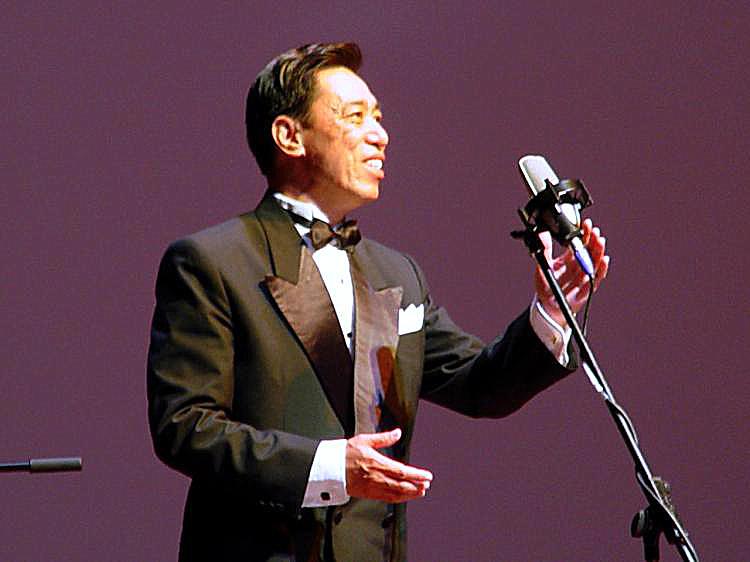At one point, Mr. Guan had planned to move to the United States and permanently leave the entertainment community, but during his years spent outside China he discovered that many of his fans longed for him to resume his singing career. After carefully thinking it over and deciding that he could still deliver a quality performance, Mr. Guan brought his distinctive, soul-stirring voice back for the public to enjoy.
In 2006, Mr. Guan joined the Divine Performing Arts, a New York based company with the lofty mission of producing “art that is not only rich, relevant, and inspiring, but also one that offers audiences of all ages a rare experience of consummate beauty and goodness.”
Having lived outside the public eye for several years and having enjoyed all the fame a singer could hope for, Mr. Guan returned to the stage with a voice as rich and inspiring as ever. His song “Who Am I?”—which speaks of a being who has come to this world helpless and confused until seeing the light at the end of the tunnel—has deeply touched the hearts of music lovers around the world, often bringing them to tears.
Mr. Guan first rose to stardom in 1979 at a concert in Beijing. He was virtually unknown at this time, yet he was sharing the stage with some of China’s most famous performers. When his name was announced, the audience’s reaction was lukewarm at best. He walked to the microphone, bowed, and began to sing. Some say that the moment he sang his first note they knew a new star was born. His youthful and romantic voice mesmerized everyone in the concert hall.
He sang two songs that night—“How Can I Not Miss Him” and “The Love of the Yellow River.” When he finished, the audience roared with applause and cheers. Fans were drawn to this beautiful voice, and Mr. Guan expanded his repertoire to please his audience. He was an instant success after his Beijing performance, and Mr. Guan’s career continued to blossom, delivering one hit song after another, including “Youth,” “Merry Songs Accompanied by Splashes,” and “Our Future Is Sweeter Than Honey.”
Throughout his distinguished career, Mr. Guan has given thousands of performances and made many recordings. In 1987, he was named one of China’s most popular singers. In 1989, he participated in the Thirteenth World Youth Festival and won the Highest Art Achievement award. He recorded more than 50 Chinese movie and television theme songs, including the movie “My Sweet Job” and the TV drama “The Summer of Harbin City.” He was given the honor of Best Man by the U.S. ABI Biography Association, and he was also given the 20th Century Achievement Award by the British Cambridge Biography Association.
Mr. Guan’s singing style is unique, combining Western method with Eastern flavor and technique. His sweet, rich voice has a wide range that enables him to sing both opera and folk songs. He is a natural with music, and Mr. Guan makes any song seem effortless. People who hear his voice often say that they are instantly relaxed and at ease, as if all their worries are washed away. Listening to his effortless style, some attempt singing his songs, only to realize just how difficult they are. Mr. Guan just makes them seem easy.
In 1983, when the 39-year-old Mr. Guan was at the peak of his singing career, he was diagnosed with hepatitis B and the early stages of cirrhosis. All his doctors advised him to stop singing. But Mr. Guan didn’t want to quit. At this point he was famous, his songs were popular, and, above all, he didn’t want to disappoint his fans.
“I went to all the prestigious hospitals in Beijing, and the doctors all advised me to stay in the hospital for rest and thorough treatment,” Mr. Guan remembers. “My friends recommended many well-known doctors of Chinese medicine, as well as secret prescriptions. I even went to see the imperial doctor, Mr. Chen, who was once responsible for the care of China’s last emperor, Fu Yi. But none of them helped. All I could do was take medication and lie in bed.”
During the 1996 Chinese New Year, a friend in the military band came to see Mr. Guan and offered him another alternative. “I know someone who has done really well in cultivation practice,” he said. Mr. Guan was naturally interested and decided to meet this person. She suggested that he read Zhuan Falun. “After hearing her story I thought that this must be a high-level practice. So I decided to practice Falun Gong,” said Mr. Guan.
Not long after beginning the practice, Mr. Guan’s health miraculously improved. He no longer felt fatigued. He slept well, his appetite returned, and the age spots that had covered his face and hands faded away. Energized as never before, Mr. Guan felt his health return, both in body and mind.
In 1996, Mr. Guan and his family moved to the United States. In 1999, the Chinese communist regime started its brutal persecution of Falun Gong, and since then, Mr. Guan has been unable to return to China to meet with his numerous fans—a most unfortunate and agonizing situation for a beloved performer who has sung folk songs for such a long time.
On tour with Divine Performing Arts, hundreds of thousands of audience members can once again experience the joy of hearing Mr. Guan’s celebrated tenor. Many have said that hearing his voice again brought back nostalgic memories of their past in China. Later, when they learned of Mr. Guan’s personal experiences with Falun Gong, these adoring fans couldn’t help but reflect upon the state of China today.
Mr. Guan’s story and his voice have been a significant influence to many Chinese, profoundly touching their hearts and souls.
The Epoch Times is a proud sponsor of the Divine Performing Arts 2009 World Tour, which begins this Friday. Please check back here regularly for news on the tour, and visit www.divineperformingarts.com for ticket information in your local city.








